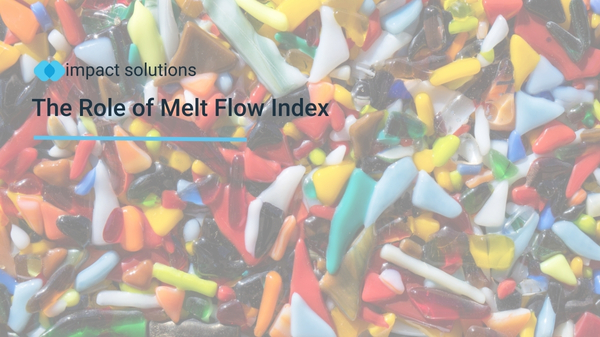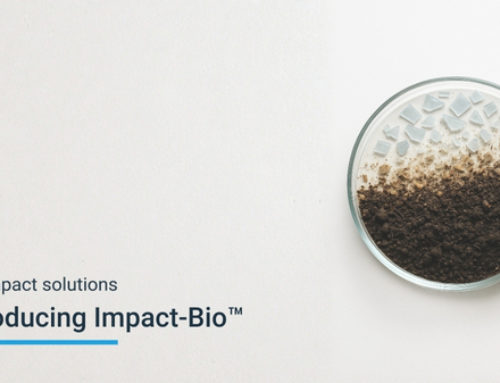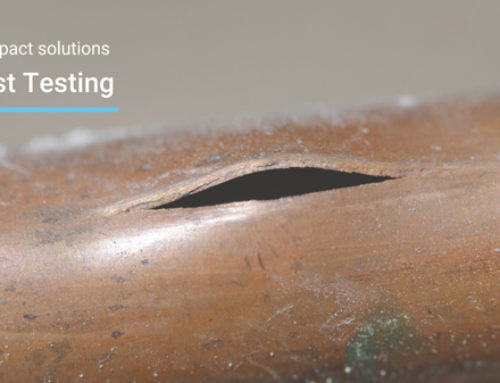At Impact Solutions, we are committed to helping industries achieve high-quality, sustainable polymer products. As recycling becomes an essential part of the plastics supply chain, ensuring consistent material performance is critical. One of the most effective ways to measure this is through the Melt Flow Index (MFI).
What Is Melt Flow Index (MFI)?
The Melt Flow Index, also called the Melt Flow Rate (MFR), measures how many grams of molten polymer pass through a die head under specific temperature and pressure conditions over ten minutes. This test, standardised under ISO 1133 and ASTM D1238, provides a quick and reliable indication of a polymer’s flow characteristics.
In simple terms, MFI is a measure of how easily a polymer melt flows, making it a key parameter for both virgin and recycled materials.
Why MFI Matters in Recycled Polymers
Recycled polymers often have more variation than virgin materials due to differences in feedstock and processing history. This is where MFI testing becomes essential:
- Consistency in Manufacturing
A stable MFI value across batches means the recycled polymer will process consistently during injection moulding, extrusion, or blow moulding. This reduces waste, downtime, and costly adjustments. - Insight into Material Properties
MFI can indicate molecular weight changes. A lower MFI usually means higher molecular weight, which often leads to stronger mechanical properties. A higher MFI can mean better flowability but may reduce strength. Knowing this helps balance performance needs. - Process Optimisation
By monitoring MFI during recycling, adjustments can be made to improve flow characteristics, making materials more suited to specific end-use applications.
The Limitations of MFI
While MFI is a powerful quality control tool, it is a single-point measurement taken under low shear. This means it gives a general picture of flowability but not a full mechanical or processing profile. However, when used alongside other testing methods, MFI remains one of the fastest and most cost-effective indicators of recycled polymer quality.
Impact Solutions’ Expertise in MFI Testing
At Impact Solutions, we provide precise, repeatable MFI testing services for a wide range of polymer types. Our laboratory is equipped to meet ISO 1133 and ASTM D1238 standards, ensuring your results are trusted and comparable across the industry.
Our approach includes:
- Rapid Turnaround – Our efficient testing process means you get reliable data quickly, supporting faster decision-making.
- Expert Analysis – We provide more than just a number; our technical team can interpret the results in the context of the intended application, helping to make informed adjustments.
- Support for Sustainability Goals – MFI testing supports circular economy objectives by making recycled polymers more predictable and reliable.
Building Confidence in Recycled Plastics
MFI testing is a cornerstone of recycled polymer quality control. It helps manufacturers maintain product performance, ensures processing efficiency, and builds confidence in the use of recycled materials. This is essential not only for regulatory compliance but also for meeting customer expectations and supporting environmental goals.
At Impact Solutions, we’re proud to help businesses embrace recycled plastics without compromising quality. Our testing services are backed by industry expertise, a UKAS accredited (no. 0402) testing laboratory, and a deep understanding of polymer behaviour.
Ready to improve your recycled polymer quality? Contact us today for expert Melt Flow Index testing and polymer analysis.
Follow us on LinkedIn, Facebook and Instagram for service updates and expert insight to the latest industry news.
FAQ
Q1: What is Melt Flow Index (MFI) testing?
MFI testing measures the flow rate of molten polymer under specific conditions, providing a quick indication of how easily the material can be processed. It’s a key quality control method for both virgin and recycled plastics.
Q2: Why is MFI important for recycled polymers?
Recycled polymers can vary in quality due to differences in feedstock and processing history. MFI testing helps ensure consistent processing behaviour and mechanical performance across batches.
Q3: How does MFI relate to polymer strength?
Lower MFI values generally indicate higher molecular weight, which can result in stronger materials. Higher MFI values improve flow but may reduce strength, knowing your MFI helps balance these factors.
Q4: Is MFI testing compliant with industry standards?
Yes, Impact Solutions conducts MFI testing in line with ISO 1133 and ASTM D1238 standards, ensuring accuracy and comparability.





